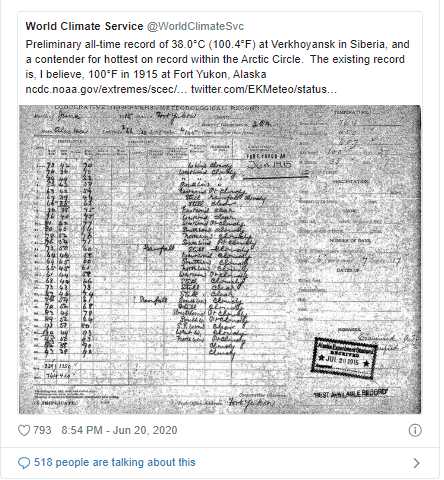When the IPCC talks about catastrophic extinctions if there is a rise of more than 6C worldwide, they’re talking about the long-term average temperatures getting pushed up that high. Short-term spikes are expected, too.
[e=mc2]
The temperature in Verkhoyansk, about 4,660 kilometres northeast of Moscow, hit 38 degrees Celsius on Saturday, according to Russia-based meteorological website Pogoda i Klimat.
For those of you who use freedomheit, that’s 100F. Back when I was a kid growing up in Baltimore, Maryland, that was a “heat wave” but now it’s just another summer. But 100F in the arctic circle is something else, entirely.

The arctic is warming at more than twice the rate of the rest of the globe, because it’s cold – or it was – so the thermal gradient is sharper.
Crop failures, fisheries collapse, wildfires in Siberia, anoxic dead zones in the oceans – we’re right in the middle of a calamity and it’s happening like the death of a thousand cuts, except we’re drunk on oil and don’t feel it.

Also on [gizmodo]

As mentioned somewhere, the current temperature spike is in line with the worst-case scenarios for 2100. In other words, it’s heating up and it’s heating up much faster than even the nightmare model.
Then there are the Russian “zombie fires” that burnt all through the year and are now remerging on the surface having gone underground.
https://www.abc.net.au/news/2020-06-19/zombie-fires-and-fire-thunderstorms-hit-arctic/12369818
Amidst a six month long heatwave and ever shrinking Arctic sea ice.
I fear we’ve well and truly passed a serious tipping point here .
SteveoR@#2:
I fear we’ve well and truly passed a serious tipping point here
We blew past it with all our flags flying, in a great big Chevy Silverado diesel pick-up truck that was modified to emit maximum smoke. There’s a cinderblock wedged against the gas pedal, and nobody’s wearing a seatbelt as they sing “I put my trust in jesus” and pass the beer around, and drink.